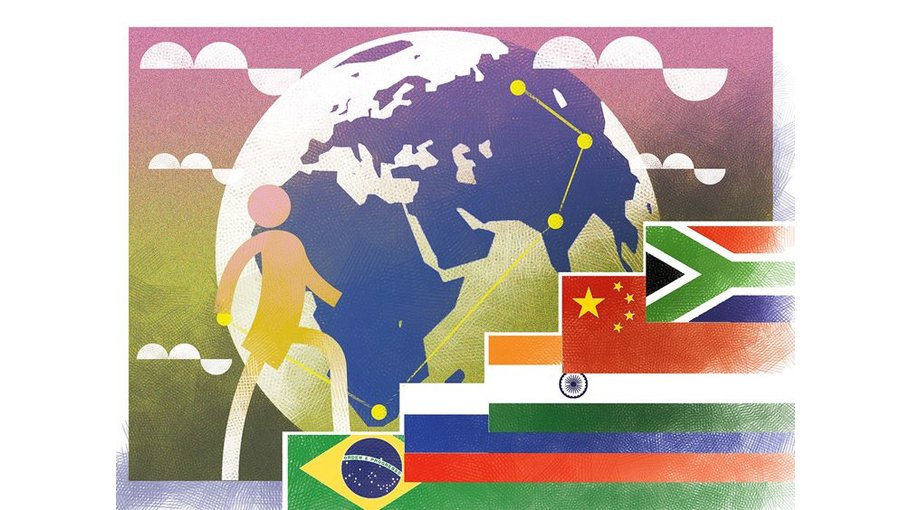An expanded BRICS can push for a new economic order
BRICS+ will be better suited to address global challenges through collaborative diplomacy

Regional and global realignments have been picking up pace for years, but the Covid-19 pandemic and the war in Ukraine have accelerated that trend. Global challenges are becoming more acute and urgent; from global warming and climate change to food shortages, illegal migration and disruptions in energy supplies.
This is why it will be interesting to follow the proceedings and outcome of one of the most important meetings to take place this year, the BRICS summit, between 22 and 24 August, in Johannesburg, South Africa.
BRICS is a group of five emerging economies — Brazil, Russia, India, China and South Africa — that have been cooperating since 2006 to address global challenges and promote mutual interests.
Membership in the group remained closed for years, but this year there appears to be a queue of potential members forming, indicating a sense of urgency by countries to address some of these challenges and strengthen partnerships away from western influence.
Foundations of a new economic order
Last June at the St. Petersburg International Economic Forum (SPIEF), Russia’s Foreign Minister Sergei Lavrov announced that the UAE, Saudi Arabia, Egypt, and Algeria are candidates for BRICS membership. Other potential candidates include Mexico, Argentina, and Indonesia. Twenty three countries have formally applied to become new BRICS members.
Some would argue that smaller groups work better, the G-7 is an example, but others see a larger club of like-minded nations working together is in a better position to set the foundations of a new economic order.
The BRICS economies have been rapidly growing and gaining prominence, with China and India emerging as major global economic players. BRICS is projected to account for 45 per cent of global GDP in purchasing power parity (PPP) terms by 2030. The group already accounts for about 31.7 per cent of the world’s GDP as of 2022, compared to the G-7’s 30 per cent share of the world’s GDP as of 2022.
Equitable international order
Additional members will only strengthen the group’s global economic presence — especially if the UAE and Saudi Arabia end up joining. But apart from the economic aspect, BRICS+ will prove to be a potent political powerhouse as well.
At a time when there is so much criticism about how western countries have failed to create a more equitable economic order in a world plagued by poverty, over exploitation of the planet’s resources, pollution, famine and disease, BRICS+ could go a long way in addressing some of these challenges.
BRICS countries have advocated for a more democratic, representative, and equitable international order that respects the diversity and sovereignty of all nations. In addition they called for strengthening their voice and influence in global governance and multilateral institutions, such as the United Nations, the G20, the World Trade Organisation, and the International Monetary Fund.
These countries can create genuine pressure to bring rival groups, namely the G-7, which is seen as a Western-centric club, representing primarily North America and Europe, to the negotiation table in order to begin reforming the current global economic and political orders.
Since its founding, BRICS has achieved some notable successes, such as establishing the New Development Bank (NDB) in 2014, which provides financing for infrastructure and sustainable development projects in BRICS and other developing countries.
It also launched the Partnership on New Industrial Revolution (PartNIR) in 2018, which aims to foster cooperation on innovation, digital economy, industrialisation, and skills development among BRICS countries. The group has also set up the Contingent Reserve Arrangement, which is a framework for the provision of support through liquidity and precautionary instruments in response to actual or potential short-term balance of payments pressures.
Integration with the global economy
The rising appeal for BRICS, by countries in the southern hemisphere, can be appreciated for several reasons. Collectively, BRICS nations represent a significant portion of the world’s population, more than 40 per cent, and their economies have experienced rapid growth over the years. Their increasing integration with the global economy has attracted attention, as they offer opportunities for trade, investment, and business collaborations.
Their growing middle class, urbanisation, and expanding consumer markets make them attractive destinations for businesses looking to tap into new consumer bases and diversify their operations. In addition, BRICS nations possess abundant natural resources, ranging from oil and gas reserves to minerals and agricultural land.
In the long run, the BRICS countries, being from the Global South, promote South-South cooperation, sharing knowledge, expertise, and resources among themselves and other developing nations. This approach resonates with countries that seek alternatives to traditional Western-dominated models of development.
For example, one can only see how the UAE’s contribution to BRICS+ can be made particularly in the tech sector, including areas like artificial intelligence, renewable energy, internet services and space exploration.
The rising interest in BRICS can also be attributed to the polarising nature of the war in Ukraine and its deep effects on geopolitical balances, global trade and energy supplies as well as global food security.
Hopefully lessons will be learnt from past experiences and the leadership will chart a path that will deliver on most of BRICS goals and objectives at a time when the planet faces unprecedented global challenges.
Osama Al Sharif is a journalist and political commentator.
Source: Gulf News



